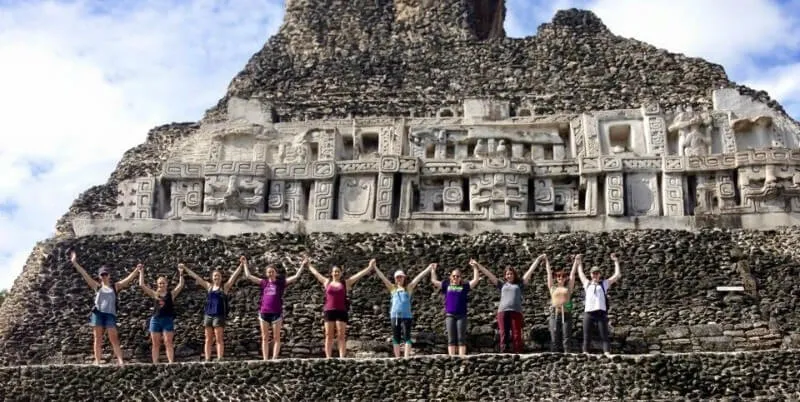In the cardiology unit at University of Vermont Medical Center, nurse Haley Karr ’17 helps patients learn to make healthy choices to improve their well-being and prevent worsening of cardiovascular disease. She especially likes working with people of diverse backgrounds and guiding them toward resources and support, and is grateful to have developed skills in health education and intercultural communication while studying abroad.
In her second year as a nursing student in the College of Nursing and Health Sciences, Karr visited Belize for a travel course called Women’s Health and Spirituality – A Cross-Cultural Exploration. Instructor Jeanne Marie Kaczka-Valliere teaches the three-credit course each winter during the holiday break. Students learn about reproductive health from local doctors, nurses, traditional healers, social workers, psychiatrists, drug and alcohol counselors and teachers. The course gives American students an opportunity to compare and contrast divergent health care systems.
“It was a cultural immersion. I got to see different communities and what they are about,” said Karr. “Patient education is what I do every day now. It is the most effective way to lower readmission rates and reinforce lifestyle changes. Belize gave me a good start to learning how to educate people about their health.”
Choices for All Majors
The course in Belize is one of many study abroad options offered to CNHS students. Numerous short-term courses take place during winter or spring breaks and offer three to six credits. Several longer-term courses occur over full semesters, allowing students to earn 15-18 credits that count for required courses in their major. Most full semester programs cost the same or less than a semester at UVM. Students who go on UVM semester or exchange programs can take their UVM and federal financial aid with them, and additional scholarships are available.
A new exchange program will allow health sciences students to spend a semester at Maastricht University in the Netherlands taking classes in global health, health care policy, disease prevention and mental healthcare. Nursing students can spend a clinical semester at Edith Cowan University or University of Southern Queensland in Australia. Several universities in Ireland and the United Kingdom offer health sciences coursework including exercise and movement science and physical therapy. Students also participate in independent research, internships, practicums, or rotations abroad for credit.
“We are constantly opening new options, so I want students to know that new things are coming on line, and they should never assume nothing is available for their major,” said Kim Howard, director of the UVM Office of International Education.
Planning early for studying abroad is key. Students should work with their advisors to discuss combining cultural learning with their academic requirements. Students contemplating abroad study must attend Study Abroad 101, hosted by the UVM Office of International Education. These mandatory information sessions occur three times each week when classes are in session.
“Ideally, students attend a Study Abroad 101 session 12 months before they intend to study abroad,” Howard advises.
Classes can be taken in a foreign language or in English, even in countries where English is not the native language. Courses taken abroad may fulfill major, minor or distribution requirements.
“It’s open to students in any program,” said Kaczka-Valliere of the course in Belize. “It’s interdisciplinary. We’ve had students interested in anthropology, biology, animal science, women’s studies, engineering and pre-med. We try to make a mix of students. Everyone has something to offer.”
Valuable Skills for Health Care Providers
Studying abroad helps students develop and hone skills that help them stand out to employers, including self-reliance, problem-solving and intercultural communication. Sensitivity to cultural diversity is vital in health care professions, where patient-provider relationships impact quality of care.
“It’s important for individuals in health care fields to be culturally competent,” said Kaczka-Valliere.
Students studying abroad mingle with local residents, explore towns and villages, go on outings and visit tourist sites. It’s a chance to experience a different part of the world and bond with other UVM students in the same or different majors. Karr met her best friend, Hannah Sumner '17, on the Belize excursion. Now they share an apartment and work together at UVMMC.
“The camaraderie within our group and with the women we met struck me the most,” said Sumner. “We met people diagnosed with AIDs who spent the afternoon talking with us about what it was like. We saw a place where women were working, sitting together around sewing machines making quilts, talking and supporting each other. We learned a lot about ourselves. The trip changed me.”
Abroad study options for CNHS students include:
Belize: Public health nursing or women’s health & spirituality
Cuba: Complimentary and alternative medicine
Iceland: Health effects of thermal springs
Mongolia: Traditional Mongolian Medicine
Netherlands: Health science, public health policy or nursing
